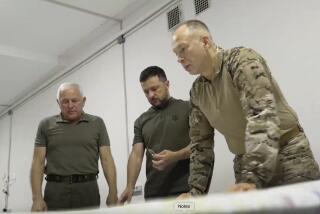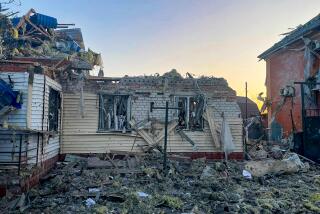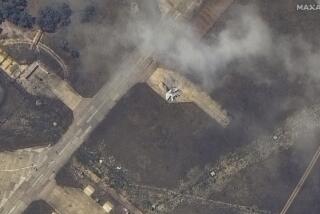More Russian Troops to Arrive in Chechnya : Caucasus: Yeltsin appeals to Chechens to end resistance. Campaign aimed at quashing independence bid appears bogged down.
- Share via
MOSCOW — Russia ordered fresh troops to the tiny republic of Chechnya on Wednesday after 11 days of a sluggish, inconclusive military campaign aimed at crushing its bid for independence.
Russian President Boris N. Yeltsin appealed to the Chechen people to stop their armed resistance, and he promised they will never again be deported from their homeland, as they were 50 years ago.
Yeltsin also instructed military commanders to “spare no effort in restoring the rule of the Russian constitution” in the Muslim republic.
Two battalions of Russian marines were to arrive in Chechnya today to reinforce forward units near Grozny, the rebel capital, Russia’s Interfax news agency reported. A motorized infantry regiment was also en route.
Thousands of Russian troops have been bogged down in heavy skirmishing on Grozny’s outskirts since they rolled into the republic in tanks.
Amid rising casualties on both sides, Foreign Minister Andrei V. Kozyrev admitted Wednesday that the offensive, Moscow’s biggest since the Soviet invasion of Afghanistan in 1979, was going much slower than planned.
A Russian lawmaker on the scene said 11 Russian soldiers were killed Tuesday night in heavy fighting north of Grozny. Villagers on an unarmed collective near the city told foreign reporters that tank shelling killed five children from a single family that night.
Chechnya’s irregular army appeared to be suffering ammunition shortages that kept its antiaircraft guns silent for the first time in four straight nights of Russian bombing and missile assaults on Grozny.
As the siege wore on with no clear outcome in sight, Yeltsin issued his first communique of the offensive, seeking to overcome the Chechens’ worst fear of Russian domination. That fear is rooted in the deportation of 800,000 Chechens by Soviet dictator Josef Stalin, who suspected them of wartime sympathies with the Nazis.
Historians say at least 200,000 Chechens died in rail cars en route to Siberia.
In a statement read for him on television, Yeltsin accused Chechnya’s separatist leaders of spreading “malicious rumors” that another such ordeal was in store for the Chechens, “in order to arouse their fears and hatreds and to induce them to resist the legitimate authorities.”
“Deportation of the Chechen people will never occur under any circumstances,” he declared. “Those who were forced (by the fighting) to leave their homes will be able to return unobstructed.”
The appeal came a day after Gen. Dzhokar M. Dudayev, the Chechen leader who declared independence from Russia three years ago, abandoned his nine-story presidential palace in Grozny and dropped from public view.
Yeltsin said Russian troops aimed to “restore legality, law and order” in the southern republic of 1.2 million people. He promised generous help to restore its moribund oil-based economy if the resistance stops.
Chechens listen to official Russian statements, but the brute force of the military campaign may have negated any positive impact of Yeltsin’s belated promises.
Yeltsin prepared the statement after his human rights commissioner visited Chechnya, reported counting 42 dead civilians and declared the offensive itself to be a violation of human rights.
Russian officials said as many as 100,000 Chechens have fled their mountainous homeland in the last 11 days, but foreign reporters in Grozny said the will to resist the Russians is high among those who remain.
“Our ancestors were fighting the Russians for 300 years, and we can do the same,” an elderly man standing beside a bunker 20 miles outside Grozny told Reuters news agency.
“Chechnya is a subject only to Allah,” read a banner over Grozny, mocking Yeltsin’s insistence that Chechnya is a “subject” of the multiethnic Russian Federation.
How long the ragtag Chechen army of a few thousand men can defend Grozny is unclear.
Russia sealed off its borders with Georgia and Azerbaijan, to the south of Chechnya, in a bid to cut off war materiel to the rebels from elsewhere in the Caucasus Mountains and the Middle East.
The blockade may be effective on the main roads but not necessarily on mountain trails. As of Wednesday, the Russian army had still not managed, and perhaps not even attempted, to encircle Grozny from the south and east.
Kozyrev told reporters that the offensive was moving slowly to minimize civilian casualties. He admitted that Russian commanders had not even contemplated in advance “the option of protracted combat operations” but said the operation would go on “as long as necessary.”
In fact, many Russian commanders and troops expressed reluctance to advance any farther toward Grozny regardless of their orders.
The offensive has claimed the lives of at least 34 Russian soldiers and uncounted Chechens and has cost the beleaguered Russian treasury more than $100 million.
More to Read
Sign up for Essential California
The most important California stories and recommendations in your inbox every morning.
You may occasionally receive promotional content from the Los Angeles Times.













